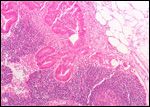Is it Time to Cut Lymph Node Status from Breast Cancer Prognosis?
Clinicians traditionally look to lymph node status when determining breast cancer prognosis. But do the nodes really deserve such attention?
Clinicians traditionally look to lymph node status when determining breast cancer prognosis. But do the nodes really deserve such attention?

Micrograph of a colorectal adenocarcinoma metastasis to a lymph node, also lymph node metastasis. H&E stain. The cancer (forming glands) is seen at the centre-top. Adipose tissue is present on the upper right. Source: Wikimedia Commons user Nephron
Not according to Emiel Rutgers, MID, chair of the Breast Unit at The Netherlands Cancer Institute-Antoni van Leeuwenhouk Hospital in Amsterdam, who suggested to his colleagues at the Miami Breast Cancer Conference that it might be time to drop lymph node status and allow the primary tumor to guide prognosis and adjuvant systemic treatments.
"We used to let lymph nodes tell the story and dictate adjuvant treatment. We didn't know any better," Dr. Rutgers told CancerNetwork, noting that he once traveled around the world encouraging the removal of every lymph node himself.
"But now we know that breast cancer dissemination is a function of the cancer cell, not the lymph nodes," he added. "In fact, many lymph node metastasis are innocent."
Dr. Rutgers pointed to contradictory evidence from a few recent studies, including two trials published in The New England Journal of Medicine in 2009 (doi: 10.1056/NEJMoa0904832) and 2011 (doi: 10.1056/NEJMoa1008108), which evaluated outcomes of patients with isolated tumor cells or micrometastases in their lymph nodes.
The first study "fueled the debate," he said. In addition to "relatively weak" data supporting poorer survival among patients with micrometastases or isolated tumor cells in regional lymph nodes, the retrospective trial found that patients with these growths who received chemotherapy fared better than patients who did not get systemic treatment.
"This is not due to an effect of the isolated tumor cells. It's because of chemotherapy's effect on disseminated disease," said Dr. Rutgers, who co-authored the paper. "We are slowly realizing that lymph nodes don't say anything about the effect of chemotherapy."
As for the latter study, he suggested that the 1.2% difference found in overall survival at 5 years between sentinel node negative patients with and without micrometastases was simply "not clinically relevant."
Further, Dr. Rutgers and his Dutch team published another study in the Journal of Clinical Oncology in 2010 (doi: 10.1200/JCO.2008.21.7554), which compared axillary lymph node dissection with axillary radiation therapy in patients with positive sentinel nodes. The extent of lymph node involvement remained unknown for those receiving radiation, yet the lack of information did not appear to impact the choice of adjuvant therapy. Around 60% and 75% of patients in both groups received chemotherapy and endocrine therapy, respectively.
"Apparently, doctors do not care about the number of positive nodes," be said. "The type of therapy they chose was the same."
After analyzing the primary tumor for size, grade, hormone and HER2 status and genetic profile, Dr. Rutgers recommends removing the sentinel node with routine hematoxylin and eosin examination, and then determining the appropriate treatment.
"I would still advise some patients to have axillary clearance," he said. "But forget about prognosis and lymph nodes."